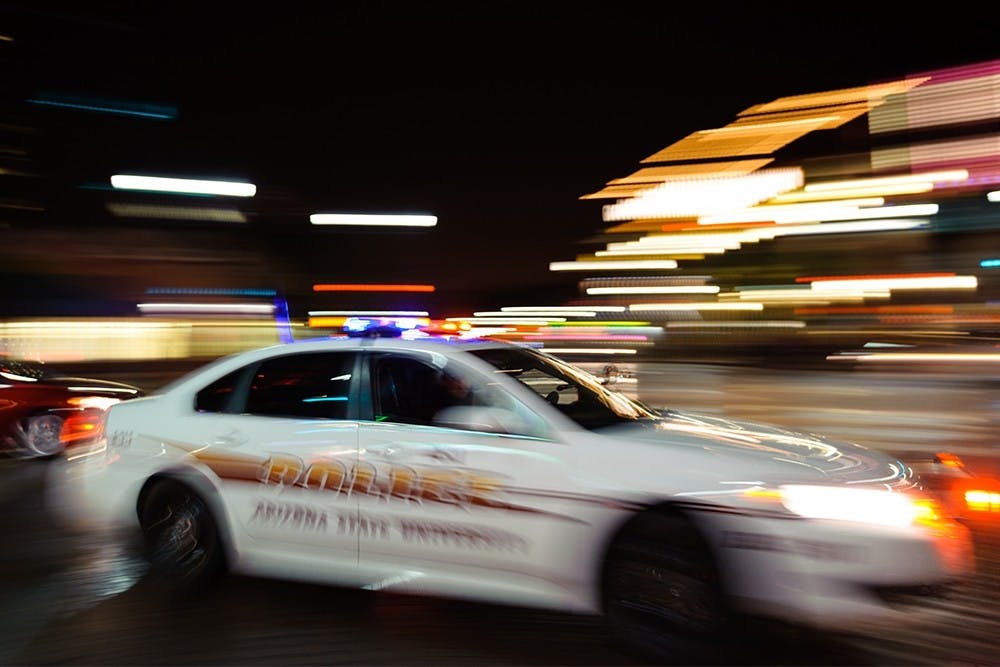Six of nine party citations issued over the first weekend of the semester by the Tempe Police Department were "student-related," a department spokesperson said Monday.
Several videos displaying students attending parties off campus have circulated on social media since students returned to campus.
One video displayed students on sidewalks waiting for entry at a house party. Others showed students gathered close to parked cars and some showed students in crowded rooms with colored lights flashing to loud music.
Student comments made toward the videos on the platforms where they were shared expressed embarrassment and disappointment to share a school with partiers.
Andrew Hyder, a senior studying business data analytics and computer information systems, said that seeing people not following social distancing and mask guidelines was "obviously not something new," but expressed surprise at "the magnitude of people in masses."
It is not "uncommon to see citations in the first weekend," said Joanne Vogel, vice president of student services. But, the University recognizes the crucial role students' off-campus behavior plays in the success of the semester amid the coronavirus pandemic, Vogel said.
"I thought common sense might prevail," Vogel said. "But I also know these are college students."
Citations, misconduct and possible punishments
The Tempe police spokesperson said the department had treated the first weekend of the semester like any other and had not changed procedure for writing citations.
The ASU Police Department, which is separate from Tempe police, logged six incidents of alcohol consumption under 21 over the weekend, according to crime logs.
A team from the University meets with Tempe police every Monday to discuss weekend incidents, Vogel said. Katie Paquet, a University spokesperson, added the University has another team monitoring social media for high-risk activities, like parties.
"If you're engaging in activity, or you're attending gatherings that are really designed to not adhere to public health protocols, that's a problem," Paquet said.
If a party takes place at a fraternity or sorority house, a Greek Review Board will look into the event and can sanction the organization. For other parties, the University will use the Student Code of Conduct to take action.
In a previous statement from a University spokesperson, the school plans to punish students they identify at events, either on or off campus, that put the community at risk — a piece of the Student Code of Conduct that has long been a part of a student's agreement to be present at ASU.
Multiple videos have also been posted on the "tempebarstool" Instagram account. Those videos showed students in residential halls violating guidelines the University has put in place, including face covering and social distancing requirements.
Communication from the University has not included details about punishment for students it cannot identify or if entire groups would be punished due to the actions of some.
So far, students have been "respectful and understanding thus far" when the University contacts them about unsafe behavior and they understand the consequences, Vogel said. She said repeat offenders "will require different intervention."
Not surprised, just disappointed
Kevin Redifer, a senior studying psychology, posted a video on Twitter Sunday night displaying a line formed on the sidewalk of a house about a half-mile away from campus.
Redifer said in a text message to The State Press that he is not one to typically snitch on someone's party, "but the pandemic changes the equation."
With Arizona's daily positive coronavirus cases decreasing after a tumultuous July, some health experts are predicting bars, restaurants and other attractions that draw in revenue from young adults will reopen to large crowds again.
"I'm comically disappointed," Hyder said. "It's just hard to understand the disconnect between wanting to be on-campus and then not following guidelines."
Redifer pointed to the college student age range as one of the main reasons partiers were not following the school's plan to mitigate the spread of the coronavirus. He blames both students and the school administration for creating what he called a dangerous environment.
In June, Laurence Steinberg, a professor of psychology at Temple University, wrote for The New York Times, "it's hard to think of an age during which risky behavior is more common and harder to deter than between 18 and 24."
Joelene Quinn, a 34-year-old freshman studying community health, said she was "annoyed" by the "childish" behavior of other students. Quinn said she struggled to understand why the University brought students to campus when controlling all of them was not possible, she said.
"College is a way to get educated, partying is not part of the college experience," Quinn said. "A college is not obligated to provide you with a chance to hang out with your friends, you can do that later, because obviously now is not the time."
The University has repeatedly said it will not release specific COVID-19 data about the school community, instead directing students to zip code data provided by the Arizona Department of Health Services.
The Tempe campus and some surrounding neighborhoods, located in 85281, has a cumulative total of 1,791 positive cases as of Monday, according to data provided by ADHS.
ASU is developing a data dashboard accumulating coronavirus data by zip code, President Michael Crow said in an interview before campus reopened.
No details have been revealed about which zip codes will be included, as not all ASU students live in 85281, or if other information will be presented.
Hyder said ASU is an educational institution first and every student should be privy to that.
"It takes all of us to go back to normal," he said.
Reach the reporters at pjhanse1@asu.edu and wmyskow@asu.edu and follow @piperjhansen and @wmyskow on Twitter.
Like The State Press on Facebook and follow @statepress on Twitter.

Wyatt Myskow is the project manager at The State Press, where he oversees enterprise stories for the publication. He also works at The Arizona Republic, where he covers the cities of Peoria and Surprise.

Piper Hansen is the digital editor-in-chief at The State Press, overseeing all digital content. Joining SP in Spring 2020, she has covered student government, housing and COVID-19. She has previously written about state politics for The Arizona Republic and the Arizona Capitol Times and covers social justice for Cronkite News.




